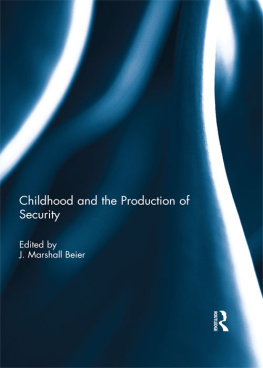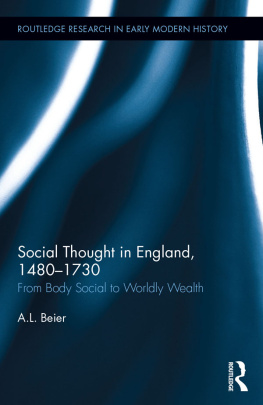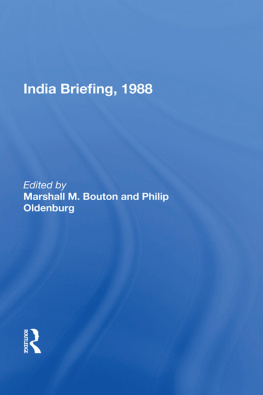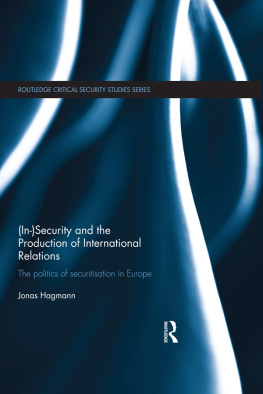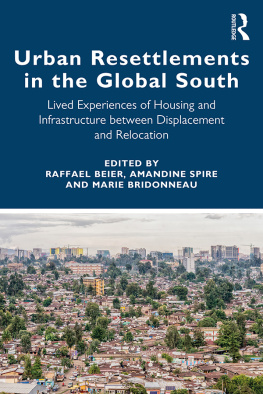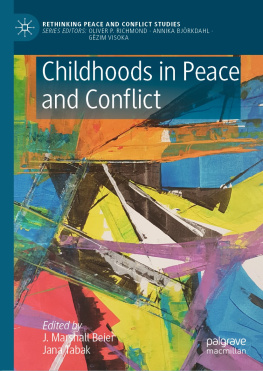Childhood and the Production of Security
Responding to security scholars puzzling dearth of attention to children and childhoods, the contributors to this volume reveal the ways in which they not only are already present in security discourses but are actually indispensable to them and to the political projects they make possible. From zones of conflict to everyday life contexts in the (post)industrial Global North, dominant ideas about childhood work to regulate the constitution of political subjects whilst variously enabling and foreclosing a wide range of political possibilities. Whether on the battlefields of Syria, in the halls of the UN, or the conceptual musings of disciplinary Security Studies, claims about or ostensibly on behalf of children are ubiquitous. Recognizing children as engaged political subjects, however, challenges us to bring a sustained critical gaze to the discursive and semiotic deployments of children and childhood in projects not of their making as well as to the ways in which power circulates through and around them.
This book was originally published as a special issue of Critical Studies on Security.
J. Marshall Beier is Professor in the Department of Political Science at McMaster University, Canada. His teaching and research centers on issues of political subjecthood with regard to childhood, indigeneity, and the discursive/semiotic production of security more broadly. His recent publications include The Militarization of Childhood: Thinking Beyond the Global South (2011), Canadian Foreign Policy in Critical Perspective (2010), Indigenous Diplomacies (2009), and International Relations in Uncommon Places: Indigeneity, Cosmology, and the Limits of International Theory (2005).
Childhood and the Production of Security
Edited by
J. Marshall Beier
First published 2017
by Routledge
2 Park Square, Milton Park, Abingdon, Oxon, OX14 4RN, UK
and by Routledge
711 Third Avenue, New York, NY 10017, USA
Routledge is an imprint of the Taylor & Francis Group, an informa business
2017 York University
All rights reserved. No part of this book may be reprinted or reproduced or utilised in any form or by any electronic, mechanical, or other means, now known or hereafter invented, including photocopying and recording, or in any information storage or retrieval system, without permission in writing from the publishers.
Trademark notice: Product or corporate names may be trademarks or registered trademarks, and are used only for identification and explanation without intent to infringe.
British Library Cataloguing in Publication Data
A catalogue record for this book is available from the British Library
ISBN 13: 978-1-138-64518-9
Typeset in Times New Roman
by RefineCatch Limited, Bungay, Suffolk
Publishers Note
The publisher accepts responsibility for any inconsistencies that may have arisen during the conversion of this book from journal articles to book chapters, namely the possible inclusion of journal terminology.
Disclaimer
Every effort has been made to contact copyright holders for their permission to reprint material in this book. The publishers would be grateful to hear from any copyright holder who is not here acknowledged and will undertake to rectify any errors or omissions in future editions of this book.
Contents
J. Marshall Beier
Cecilia Jacob
Helen Brocklehurst
Alison M. S. Watson
Lorraine Macmillan
Victoria M. Basham
Helen Berents
J. Marshall Beier
The following chapters were originally published in Critical Studies on Security, volume 3, issue 1 (April 2015). When citing this material, please use the original page numbering for each article, as follows:
Chapter 1: Introduction
Children, childhoods, and security studies: an introduction
J. Marshall Beier
Critical Studies on Security, volume 3, issue 1 (April 2015), pp. 113
Chapter 2
Children and armed conflict and the field of security studies
Cecilia Jacob
Critical Studies on Security, volume 3, issue 1 (April 2015), pp. 1428
Chapter 3
The state of play: securities of childhood insecurities of children
Helen Brocklehurst
Critical Studies on Security, volume 3, issue 1 (April 2015), pp. 2946
Chapter 4
Resilience is its own resistance: the place of children in post-conflict settlement
Alison M. S. Watson
Critical Studies on Security, volume 3, issue 1 (April 2015), pp. 4761
Chapter 5
Children, civilianhood, and humanitarian securitization
Lorraine Macmillan
Critical Studies on Security, volume 3, issue 1 (April 2015), pp. 6276
Chapter 6
Telling geopolitical tales: temporality, rationality, and the childish in the ongoing war for the Falklands-Malvinas Islands
Victoria M. Basham
Critical Studies on Security, volume 3, issue 1 (April 2015), pp. 7789
Chapter 7
Children, violence, and social exclusion: negotiation of everyday insecurity in a Colombian barrio
Helen Berents
Critical Studies on Security, volume 3, issue 1 (April 2015), pp. 90104
The following chapter was originally published in Critical Studies on Security, volume 3, issue 3 (November 2015). When citing this material, please use the original page numbering for the article, as follows:
Chapter 8
Shifting the burden: childhoods, resilience, subjecthood
J. Marshall Beier
Critical Studies on Security, volume 3, issue 3 (November 2015), pp. 237252
For any permission-related enquiries please visit:
http://www.tandfonline.com/page/help/permissions
Victoria M. Basham is a Senior Lecturer in Politics at the University of Exeter, UK. Her research focuses on issues of gender, race, class, and sexuality in relation to militaries, militarism, and militarization.
J. Marshall Beier is Professor in the Department of Political Science at McMaster University, Canada. His teaching and research centers on issues of political subjecthood with regard to childhood, indigeneity, and the discursive/semiotic production of security more broadly. His recent publications include The Militarization of Childhood: Thinking Beyond the Global South (2011), Canadian Foreign Policy in Critical Perspective (2010), Indigenous Diplomacies (2009), and International Relations in Uncommon Places: Indigeneity, Cosmology, and the Limits of International Theory (2005).
Helen Berents is a Lecturer in the School of Justice at the Queensland University of Technology, Australia. Her research explores ways of engaging with conflict-affected young people and strategies for everyday peacebuilding. More broadly, she examines questions of forced migration, theories of childhood, peace and conflict studies, and feminist discourses of marginalization.
Helen Brocklehurst has been a full-time Lecturer at Swansea University, UK, since 2005. She is the author of Whos Afraid of Children: Children Conflict and International Relations


